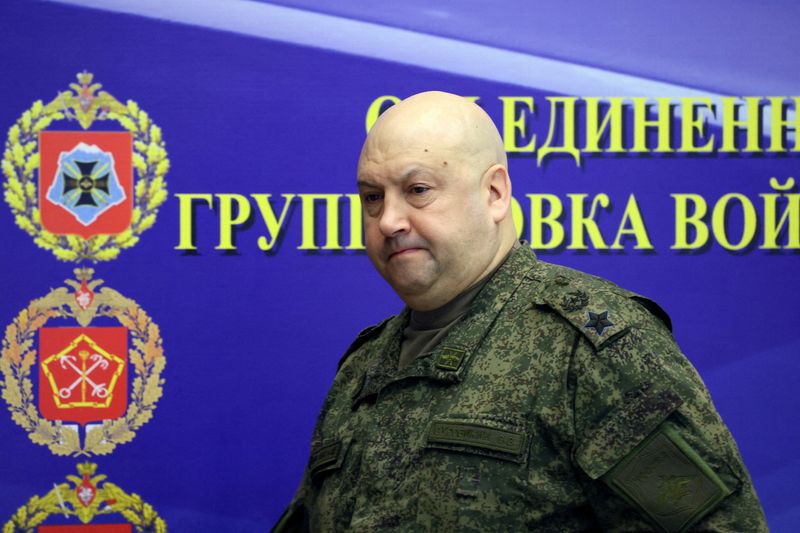Factbox-Who is Russia’s ‘General Armageddon’ Surovikin, missing since mutiny?
2023.06.29 08:39

© Reuters. FILE PHOTO: General Sergei Surovikin, commander of Russian forces in Ukraine, visits the Joint Headquarters of the Russian armed forces involved in military operations in Ukraine, in an unknown location in Russia, in this picture released December 17, 202
(Reuters) – Army General Sergei Surovikin, nicknamed “General Armageddon” by the Russian media for his reputed ruthlessness, is among senior generals who have disappeared from public view since Saturday’s failed mutiny aimed at toppling the top brass.
The burly, shaven-headed 56-year-old was last seen on Saturday when he appeared in a video, looking uncomfortable and breathing hard, and without insignia, urging the chief of the Wagner Group mercenaries, Yevgeny Prigozhin, to give up.
A New York Times report, based on a U.S. intelligence briefing, said Surovikin had advance knowledge of the mutiny and that authorities were checking if he was complicit.
The Kremlin played down that report but on Thursday declined to answer questions about the general.
Here are some key facts about Surovikin:
UKRAINE CAMPAIGN
Surovikin, then commander of Russian forces in southern Ukraine, was given overall command of the Ukraine campaign on Oct. 8 – the first to be publicly named in that role.
Russia had just been routed in the northeastern Kharkiv region. Within a month, he had ordered a withdrawal from the west bank of the Dnipro river in Ukraine’s southern Kherson region, recognising that his forces were in danger of being cut off by the bombardment of the Antonivskyi bridge.
The contingent, estimated by the U.S. at 30,000, retreated in good order, blowing up the bridge behind them.
Ukraine’s defence minister and Western diplomats said Surovikin appeared to have boosted discipline while also stepping up attacks on infrastructure.
His image as a hulking Siberian willing to use brutal tactics to get results appealed to Russian nationalists, who felt he could oversee the retreat without opening up dangerous internal divisions.
Nevertheless, with the war stagnating, he was subordinated to Chief of the General Staff Valery Gerasimov in January, staying on as one of Gerasimov’s three deputies.
WAGNER
After the Kherson pullout, Prigozhin, a fierce critic of Gerasimov and Defence Minister Sergei Shoigu, praised Surovikin as “a man who is not afraid of responsibility”. A month ago, Prigozhin said Surovikin should replace Gerasimov.
When Prigozhin staged his mutiny, Surovikin was one of two generals who publicly urged him in videos to give up. Surovikin looked strained and awkward, however.
U.S. officials told Reuters on Wednesday that Surovikin had supported Prigozhin, but that Western intelligence did not know with certainty if he had helped the rebellion in any way.
The Moscow Times and one military blogger reported Surovikin’s arrest, while some other heavily followed defence correspondents said he and other senior officers were being questioned by the FSB security service to verify their loyalty. Reuters could not independently verify those reports.
SYRIA
In 2017, while commanding Russia’s vast Eastern Military District, Surovikin was sent for around eight months to head forces deployed to Syria to help President Bashar al-Assad fight diverse rebel groups.
By the time he finished his assignment, the civil war had turned in Assad’s favour and President Vladimir Putin was preparing a visit to announce a drawdown of Russian forces.
Surovikin was rewarded with the command of Russia’s Aerospace Forces and made a Hero of Russia. By 2021 he was an Army General, equal in rank to Gerasimov.
While Russia denied targeting civilians, the Syrian Observatory for Human Rights monitoring group said Russian air strikes and often indiscriminate bombing killed 5,700 civilians in the two years to September 2017.








